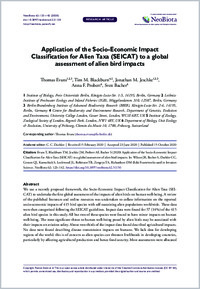Application of the Socio-Economic Impact Classification for Alien Taxa (SEICAT) to a global assessment of alien bird impacts
- Evans, Thomas Institute of Biology, Freie Universität Berlin, Königin-Luise-Str. 1-3, 14195, Berlin, Germany - Leibniz-Institute of Freshwater Ecology and Inland Fisheries (IGB), Müggelseedamm 310, 12587, Berlin, Germany - Berlin-Brandenburg Institute of Advanced Biodiversity Research (BBIB), Königin-Luise-Str. 2-4, 14195, Berlin, Germany
- Blackburn, Tim M. Centre for Biodiversity and Environment Research, Department of Genetics, Evolution and Environment, University College London, Gower Street, London, WC1E 6BT, UK - Institute of Zoology, Zoological Society of London, Regent’s Park, London, NW1 4RY, UK
- Jeschke, Jonathan M. Institute of Biology, Freie Universität Berlin, Königin-Luise-Str. 1-3, 14195, Berlin, Germany - Leibniz-Institute of Freshwater Ecology and Inland Fisheries (IGB), Müggelseedamm 310, 12587, Berlin, Germany - Berlin-Brandenburg Institute of Advanced Biodiversity Research (BBIB), Königin-Luise-Str. 2-4, 14195, Berlin, Germany
- Probert, Anna F. Department of Biology, Unit Ecology & Evolution, University of Fribourg, Chemin du Musée 10, 1700, Fribourg, Switzerland
- Bacher, Sven Department of Biology, Unit Ecology & Evolution, University of Fribourg, Chemin du Musée 10, 1700, Fribourg, Switzerland
-
15.10.2020
Published in:
- NeoBiota. - 2020, vol. 62, p. 123–142
English
We use a recently proposed framework, the Socio-Economic Impact Classification for Alien Taxa (SEICAT) to undertake the first global assessment of the impacts of alien birds on human well-being. A review of the published literature and online resources was undertaken to collate information on the reported socio-economic impacts of 415 bird species with self-sustaining alien populations worldwide. These data were then categorised following the SEICAT guidelines. Impact data were found for 57 (14%) of the 415 alien bird species in this study. All but two of these species were found to have minor impacts on human well-being. The most significant threat to human well- being posed by alien birds may be associated with their impacts on aviation safety. About two-thirds of the impact data found described agricultural impacts. No data were found describing disease transmission impacts on humans. We lack data for developing regions of the world: this is of concern as alien species can threaten livelihoods in developing countries, particularly by affecting agricultural production and hence food security. Most assessments were allocated a ‘Low’ confidence score. This may be because SEICAT is a new framework, requiring data on the way in which alien species affect human well-being, as measured by changes to human activities: even where we do have data describing an alien bird impact, information on how profoundly this impact affects people’s activities is currently rarely available.
- Faculty
- Faculté des sciences et de médecine
- Department
- Département de Biologie
- Language
-
- English
- Classification
- Biological sciences
- License
-
License undefined
- Identifiers
-
- RERO DOC 329709
- DOI 10.3897/neobiota.62.51150
- Persistent URL
- https://folia.unifr.ch/unifr/documents/308910
Statistics
Document views: 191
File downloads:
- pdf: 159
